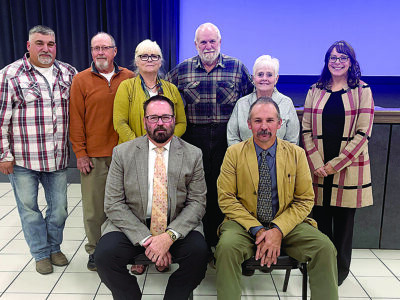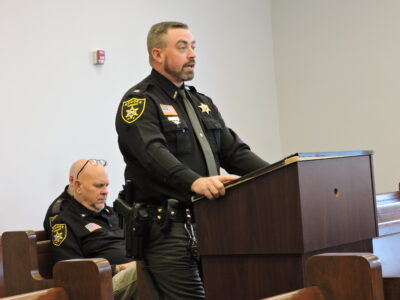Three seek 1st Judicial Circuit Court judge Division 1 seat
Three area residents will appear on ballots in the May 14 West Virginia primary election as candidates for 1st Judicial Circuit Court judge Division 1, a position that involves hearing criminal and civil cases in Hancock, Brooke and Ohio counties.
They are challengers Joseph Barki III of Wheeling and Dean Elliott Williams of Triadelphia and incumbent Ronald Wilson of Weirton.
Williams didn’t respond to requests for information.
Barki was elected Brooke County prosecutor in 2013 after serving as assistant prosecuting attorney for about 11 years, prosecuting more than 60 circuit court trials in the three counties and successfully prosecuting 10 murder trials.
Also named a special assistant to the U.S. Attorney’s Office in 2012, Barki said, “I have handled more than 1,000 felony cases during my 21-year prosecuting career in both state and federal court, predominately in the areas of drug and violent crime.”
He said he’s had significant experience handling abuse and neglect cases and juvenile prosecutions, argued successfully six times before the West Virginia Supreme Court of Appeals, and served as counsel for the plaintiff or defense in six civil trials.
A graduate of Brooke High School, Barki graduated Bethany College summa cum laude and Widener University Law School in the top 8 percent of his class.
While at Widener, he received the Alexander V. Sarcone Award, which is presented to the student with the highest average and ability in criminal law, and was named to the Order of Barristers, an honor representing outstanding achievement in oral advocacy.
Barki is chairman of the Hancock-Brooke-Weirton Drug Task Force and the Northern Panhandle Community Correction Board, which oversees the Lee Day Report Center; a board member for the Northern District of West Virginia Anti-Terrorism Advisory Council and a former board member for the Appalachia High Intensity Drug Trafficking Area, which was formed by Congress to assist federal, state and local law enforcement agencies in critical drug trafficking areas.
Barki said, “A judge must let the law and facts dictate the outcome of legal proceedings and issues and never be swayed by a desired outcome or relationships to attorneys appearing before him. Without that, a judge is not just administering the law but intentionally or unintentionally tilting the scales of justice.”
He said a judge must ensure the victims of a crime aren’t forgotten and that criminals are held accountable for their actions by using proper judicial discretion in handing down sentences appropriate to the crimes or violations.
“Sentences are prescribed by statute, but how that sentence is served — whether it be in the penitentiary, on probation or on home confinement — is most often in the judge’s discretion.”
Bark added, “When utilizing alternative sentences such as probation, home confinement and drug treatment, violations of those alternatives must be dealt with appropriately or the judicial system loses its authority and integrity.”
He said also vital to a judge’s integrity is the timely handling of all court matters, especially in cases involving child abuse and neglect, when their future care should be of primary concern.
Wilson was appointed to the bench by Gov. Jay Rockefeller in 1981 and re-elected to it for five eight-year terms. He has been a member of the West Virginia Judicial Association for 15 years, chairing it for 10 years; was named Judge of the Year by the West Virginia Association for Justice and received the West Virginia Bar Association’s Frederick Stamp Award for Judicial Excellence.
He chaired the state’s judicial investigation committee for 10 years, was assigned to hear a Mingo County case involving alleged political corruption in the 1980s and voluntarily presided over more than 2,000 West Virginia cases involving asbestos-related cancer.
His role in the asbestos cases led to his being invited to lecture on them at the Harvard University Medical School, and he has taught courses for the state bar association, West Virginia Association for Justice, West Liberty University and West Virginia Northern Community College.
Among other topics, he has taught rules of evidence to other judges, magistrates, mental hygiene commissioners, attorneys and law clerks.
A graduate of Weir High School, American University and the University of Maryland School of Law, he was one of 100 young lawyers to be awarded a fellowship through the U.S. Office of Economic Opportunity and early in his career was assigned to community legal aid programs in Charleston and Pittsburgh.
In 1971, he joined the New Cumberland law firm of Jordan and Flowers, later becoming a partner, and served a two-year term in the state House of Delegates prior to his judicial career.
Wilson noted his responsibilities as 1st Judicial Circuit Court judge have included presiding over all Brooke County criminal cases, all Hancock County abuse, neglect and juvenile delinquency cases and one-fourth of all civil cases in the three counties.
Each candidate was asked what qualities a judge should possess.
Barki said, “A judge must let the law and facts dictate the outcome of legal proceedings and issues and never be swayed by a desired outcome or relationships to attorneys appearing before him. Without that, a judge is not just administering the law but intentionally or unintentionally tilting the scales of justice.”
He said a judge must ensure the victims of a crime aren’t forgotten and that criminals are held accountable for their actions by using proper judicial discretion in handing down sentences appropriate to the crimes or violations.
“Sentences are prescribed by statute, but how that sentence is served — whether it be in the penitentiary, on probation or on home confinement — is most often in the judge’s discretion.”
Bark added, “When utilizing alternative sentences such as probation, home confinement and drug treatment, violations of those alternatives must be dealt with appropriately or the judicial system loses its authority and integrity.”
He said also vital to a judge’s integrity is the timely handling of all court matters, especially in cases involving child abuse and neglect, when their future care should be of primary concern.
Wilson said, “More than 42 years of experience has given me a wealth of insight into what is fair and right. As a judge, I am sworn to follow the laws our legislature created and apply them to the facts produced in court.”
“I don’t choose the cases assigned to me. I accept all of them,” he said, adding he strives for fairness in all legal proceedings, no matter their status.
“Experience has taught me that compassion and an understanding heart are essential qualities for a judge. I also believe a smile and a little humor are good things for a judge to have,” he said.
Wilson said he follows the philosophy of Abraham Lincoln, who practiced law before entering the White House, and said, “I do the very best I know how, the very best I can, and mean to keep doing so until the end.”
In addition to this race, the primary election features three other unopposed circuit judge candidates in the 1st Judicial Circuit: incumbent David J. Sims in Division 2; incumbent Jason A. Cuomo in Division 3; and incumbent Michael J. Olejasz in Division 4.





